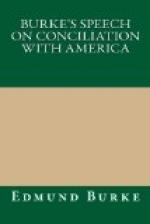From that time Ireland has ever had a general Parliament,
as she had before a partial Parliament. You changed
the people; you altered the religion; but you never
touched the form or the vital substance of free government
in that kingdom. You deposed kings; [Footnote:
47] you restored them; you altered the succession to
theirs, as well as to your own Crown; but you never
altered their Constitution, the principle of which
was respected by usurpation, restored with the restoration
of monarchy, and established, I trust, forever, by
the glorious Revolution. This has made Ireland
the great and flourishing kingdom that it is, and,
from a disgrace and a burthen intolerable to this nation,
has rendered her a principal part of our strength
and ornament. This country cannot be said to
have ever formally taxed her. The irregular things
done in the confusion of mighty troubles and on the
hinge of great revolutions, even if all were done
that is said to have been done, form no example.
If they have any effect in argument, they make an
exception to prove the rule. None of your own
liberties could stand a moment, if the casual deviations
from them at such times were suffered to be used as
proofs of their nullity. By the lucrative amount
of such casual breaches in the Constitution, judge
what the stated and fixed rule of supply has been
in that kingdom. Your Irish pensioners would starve,
if they had no other fund to live on than taxes granted
by English authority. Turn your eyes to those
popular grants from whence all your great supplies
are come, and learn to respect that only source of
public wealth in the British Empire.
My next example is Wales. This country was said
to be reduced by Henry the Third. It was said
more truly to be so by Edward the First. But though
then conquered, it was not looked upon as any part
of the realm of England. Its old Constitution,
whatever that might have been, was destroyed, and no
good one was substituted in its place. The care
of that tract was put into the hands of Lords Marchers
[Footnote: 48]—a form of government
of a very singular kind; a strange heterogeneous monster,
something between hostility and government; perhaps
it has a sort of resemblance, according to the modes
of those terms, to that of Commander-in-chief at present,
to whom all civil power is granted as secondary.
The manners of the Welsh nation followed the genius
of the government. The people were ferocious,
restive, savage, and uncultivated; sometimes composed,
never pacified. Wales, within itself, was in perpetual
disorder, and it kept the frontier of England in perpetual
alarm. Benefits from it to the state there were
none. Wales was only known to England by incursion
and invasion.




